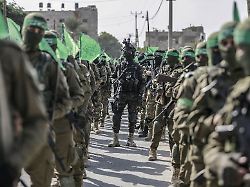October 7th massacre
Hamas leadership reveals perfidious target of their attack
November 8th, 2023, 9:25 p.m
Listen to article
This audio version was artificially generated. More info | Send feedback
It is still unclear what exactly Hamas, which is significantly inferior to the Israelis militarily, wanted to achieve with its terrorist attack. Leaders now say this is about much more than a clash with the army. Accordingly, they want to mobilize the Arab world to war against Israel.
According to a report in the New York Times, the Islamist Hamas consciously accepted an escalation of the conflict with the bloody terrorist attack on Israel on October 7th. In the Islamists’ interpretation, the aim is to revive the faltering Palestinian cause through violence, the newspaper wrote, citing conversations with several Hamas representatives.
It was necessary to “change the entire equation and not just have a clash,” said Chalil al-Haja from the Hamas leadership to the newspaper in Doha. “We managed to put the Palestinian issue back on the table and now there is no peace for anyone in the region.”
In the eyes of Hamas, the many victims on the Palestinian side as a result of Israel’s reaction are the necessary price to pay for this, the newspaper writes. The organization’s calculation is to shake the status quo and open a new, explosive chapter in the fight against Israel. “I hope that the state of war with Israel on all borders will be permanent and that the Arab world will be on our side,” the New York Times quoted Taher al-Nunu, whom the newspaper described as Hamas’s media advisor.
“What could change the equation was a major action, and it was undoubtedly clear that the reaction to this major action would be large,” said Khalil al-Haja. “We had to tell people that the Palestinian cause will not die.”
Hamas’ goal is not to rule the Gaza Strip or to supply it with water and electricity. “This battle did not take place because we wanted fuel or manpower,” he added, according to the newspaper. “It wasn’t about improving the situation in Gaza. This battle is intended to completely overturn the situation.”
Incitement partially successful
Hamas’ calculations have so far partially worked. Organizations and states expressed solidarity with the Islamist Palestinian organization and its attack. However, none of them have yet entered into a more intense, lasting military conflict with Israel.
However, there have been clashes with Hezbollah in northern Israel since October 7th – and since then there have been fears of a new front in the region. The head of Hezbollah recently threatened an escalation, but also said that the Hamas operation was planned “100 percent Palestinian.” The Houthi rebels in Yemen also recently declared war on Israel. So far, however, there have been isolated attacks, for example with missiles and drones.
Likewise, there continue to be clashes between Israel and the Syrian army or forces supported by Iran and operating from Syrian territory. Tehran has recently been building up a threatening atmosphere again and again. Iran is considered a supporter of Hamas and Hezbollah and has repeatedly warned Israel against action in the Gaza Strip. “The crimes of the Zionist entity, humanitarian and military, have crossed the red lines that could force everyone to act,” said Prime Minister Ebrahim Raisi, for example, in an interview with Al Jazeera.
Other states in the region, however, have recently shown no signs of successful incitement against Israel. EU Commission President Ursula von der Leyen recently praised Jordan’s “decisive stabilization role”. The country borders the West Bank, which is inhabited by Palestinians and Israelis. Egypt, the only state other than Israel that borders the Gaza Strip and is traditionally seen as a mediator in the Middle East, also repeatedly shows signs of de-escalation.
